Analyzing Environmental System Management in Australian Agriculture
VerifiedAdded on 2022/12/23
|8
|2190
|56
Essay
AI Summary
This essay examines the effectiveness of Environmental System Management (EMS) in the Australian agriculture sector. It explores the impacts of agricultural practices on the environment, including issues like irrigation, deforestation, and chemical use. The essay discusses the benefits of EMS, such as encouraging resource efficiency, cost reduction, and improved sales through consumer demand for organic products. It also addresses the disadvantages, including investment costs and training requirements. The paper highlights the importance of sustainable agriculture, emphasizing practices like organic manure use, rainwater harvesting, and crop rotation. The essay draws on provided readings to analyze the role of EMS in promoting environmental protection, sustainable farming, and economic viability within the agricultural sector, ultimately discussing how EMS aims to balance economic growth with environmental preservation.

Running head: EFFECTIVENESS OF ENVIRONMENTAL SYSTEM MANAGEMENT IN AGRICULTURE
Effectiveness of environmental system management in agriculture
Name of the Student:
Name of the University:
Authors note:
Effectiveness of environmental system management in agriculture
Name of the Student:
Name of the University:
Authors note:
Paraphrase This Document
Need a fresh take? Get an instant paraphrase of this document with our AI Paraphraser
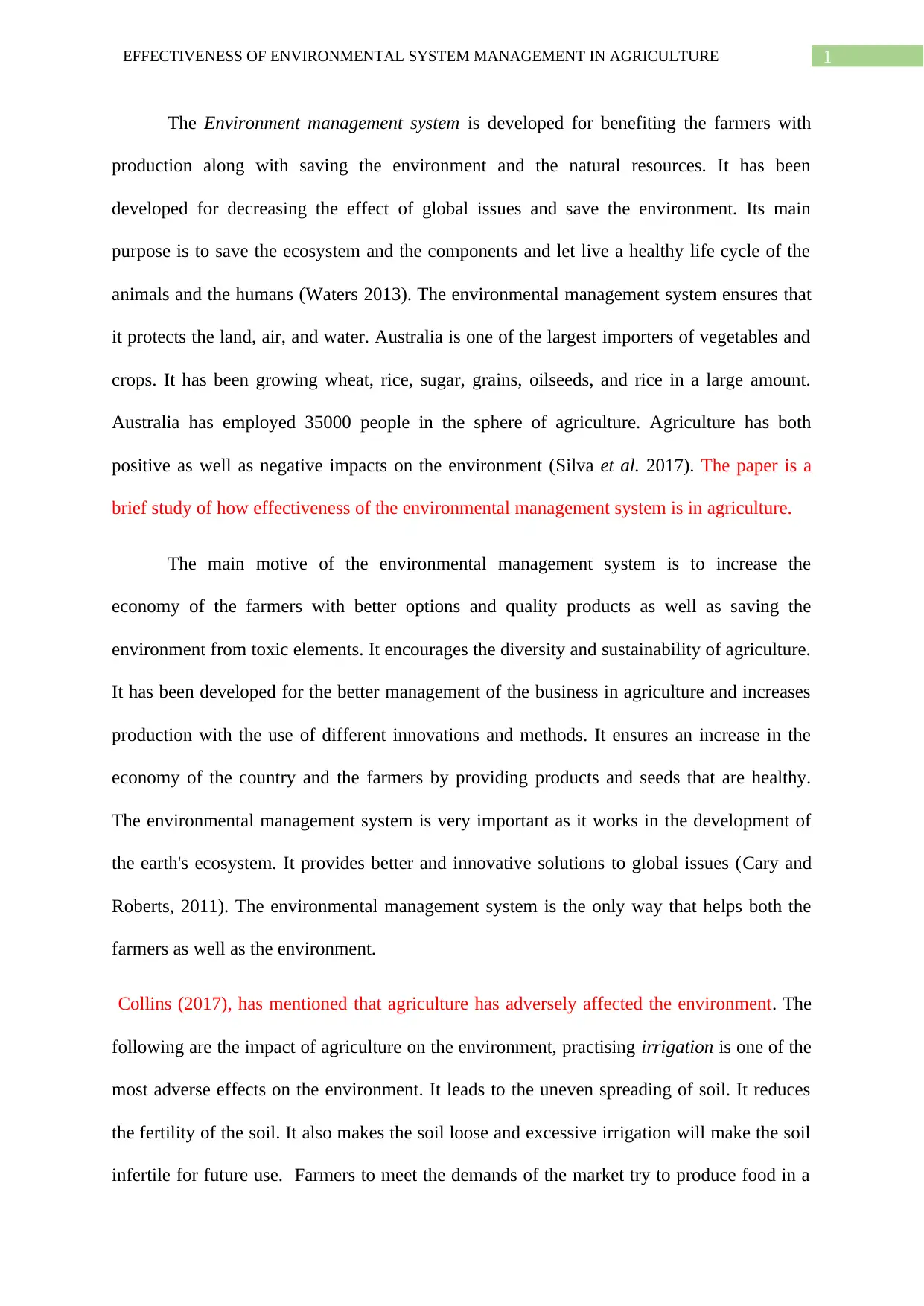
1EFFECTIVENESS OF ENVIRONMENTAL SYSTEM MANAGEMENT IN AGRICULTURE
The Environment management system is developed for benefiting the farmers with
production along with saving the environment and the natural resources. It has been
developed for decreasing the effect of global issues and save the environment. Its main
purpose is to save the ecosystem and the components and let live a healthy life cycle of the
animals and the humans (Waters 2013). The environmental management system ensures that
it protects the land, air, and water. Australia is one of the largest importers of vegetables and
crops. It has been growing wheat, rice, sugar, grains, oilseeds, and rice in a large amount.
Australia has employed 35000 people in the sphere of agriculture. Agriculture has both
positive as well as negative impacts on the environment (Silva et al. 2017). The paper is a
brief study of how effectiveness of the environmental management system is in agriculture.
The main motive of the environmental management system is to increase the
economy of the farmers with better options and quality products as well as saving the
environment from toxic elements. It encourages the diversity and sustainability of agriculture.
It has been developed for the better management of the business in agriculture and increases
production with the use of different innovations and methods. It ensures an increase in the
economy of the country and the farmers by providing products and seeds that are healthy.
The environmental management system is very important as it works in the development of
the earth's ecosystem. It provides better and innovative solutions to global issues (Cary and
Roberts, 2011). The environmental management system is the only way that helps both the
farmers as well as the environment.
Collins (2017), has mentioned that agriculture has adversely affected the environment. The
following are the impact of agriculture on the environment, practising irrigation is one of the
most adverse effects on the environment. It leads to the uneven spreading of soil. It reduces
the fertility of the soil. It also makes the soil loose and excessive irrigation will make the soil
infertile for future use. Farmers to meet the demands of the market try to produce food in a
The Environment management system is developed for benefiting the farmers with
production along with saving the environment and the natural resources. It has been
developed for decreasing the effect of global issues and save the environment. Its main
purpose is to save the ecosystem and the components and let live a healthy life cycle of the
animals and the humans (Waters 2013). The environmental management system ensures that
it protects the land, air, and water. Australia is one of the largest importers of vegetables and
crops. It has been growing wheat, rice, sugar, grains, oilseeds, and rice in a large amount.
Australia has employed 35000 people in the sphere of agriculture. Agriculture has both
positive as well as negative impacts on the environment (Silva et al. 2017). The paper is a
brief study of how effectiveness of the environmental management system is in agriculture.
The main motive of the environmental management system is to increase the
economy of the farmers with better options and quality products as well as saving the
environment from toxic elements. It encourages the diversity and sustainability of agriculture.
It has been developed for the better management of the business in agriculture and increases
production with the use of different innovations and methods. It ensures an increase in the
economy of the country and the farmers by providing products and seeds that are healthy.
The environmental management system is very important as it works in the development of
the earth's ecosystem. It provides better and innovative solutions to global issues (Cary and
Roberts, 2011). The environmental management system is the only way that helps both the
farmers as well as the environment.
Collins (2017), has mentioned that agriculture has adversely affected the environment. The
following are the impact of agriculture on the environment, practising irrigation is one of the
most adverse effects on the environment. It leads to the uneven spreading of soil. It reduces
the fertility of the soil. It also makes the soil loose and excessive irrigation will make the soil
infertile for future use. Farmers to meet the demands of the market try to produce food in a
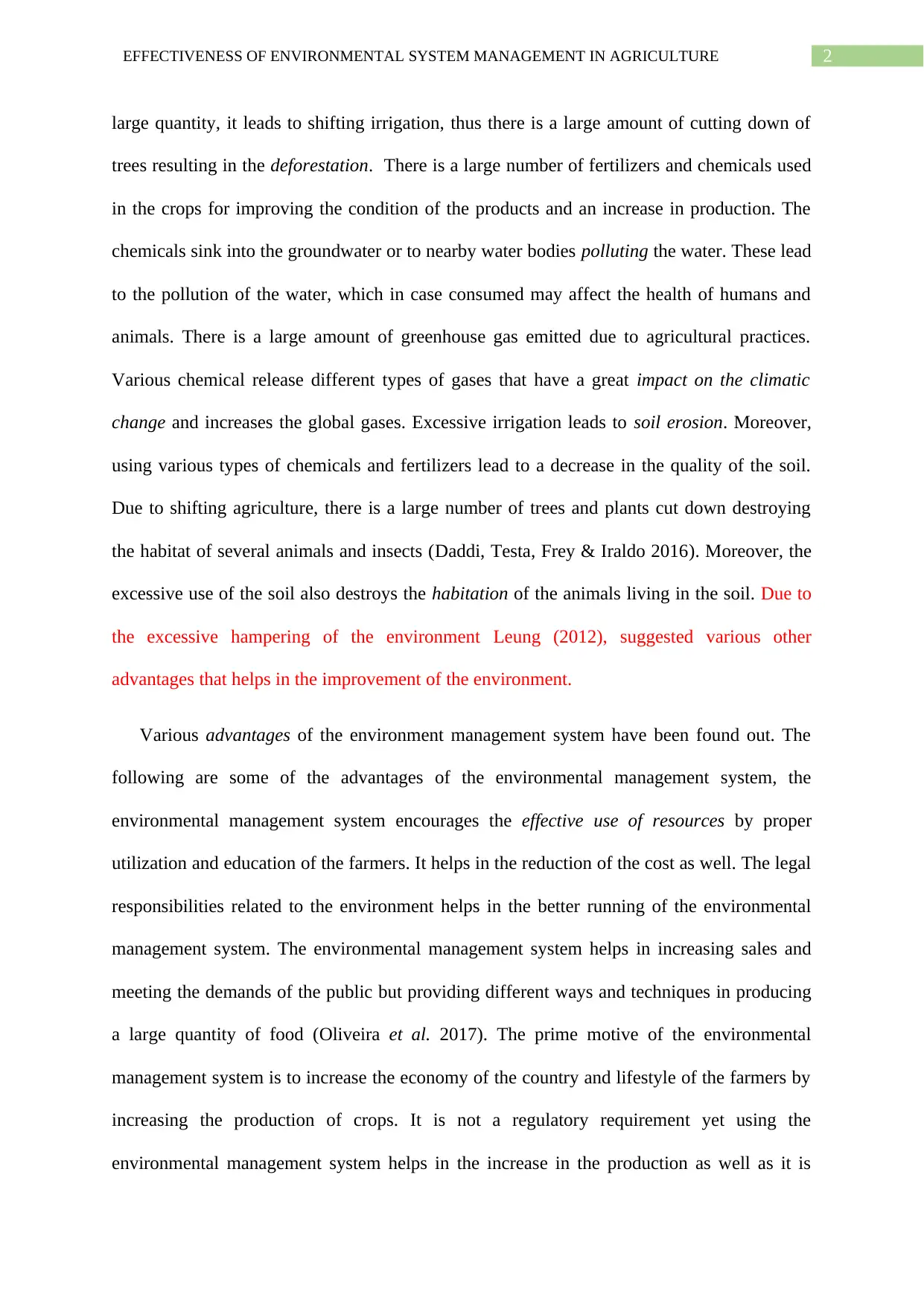
2EFFECTIVENESS OF ENVIRONMENTAL SYSTEM MANAGEMENT IN AGRICULTURE
large quantity, it leads to shifting irrigation, thus there is a large amount of cutting down of
trees resulting in the deforestation. There is a large number of fertilizers and chemicals used
in the crops for improving the condition of the products and an increase in production. The
chemicals sink into the groundwater or to nearby water bodies polluting the water. These lead
to the pollution of the water, which in case consumed may affect the health of humans and
animals. There is a large amount of greenhouse gas emitted due to agricultural practices.
Various chemical release different types of gases that have a great impact on the climatic
change and increases the global gases. Excessive irrigation leads to soil erosion. Moreover,
using various types of chemicals and fertilizers lead to a decrease in the quality of the soil.
Due to shifting agriculture, there is a large number of trees and plants cut down destroying
the habitat of several animals and insects (Daddi, Testa, Frey & Iraldo 2016). Moreover, the
excessive use of the soil also destroys the habitation of the animals living in the soil. Due to
the excessive hampering of the environment Leung (2012), suggested various other
advantages that helps in the improvement of the environment.
Various advantages of the environment management system have been found out. The
following are some of the advantages of the environmental management system, the
environmental management system encourages the effective use of resources by proper
utilization and education of the farmers. It helps in the reduction of the cost as well. The legal
responsibilities related to the environment helps in the better running of the environmental
management system. The environmental management system helps in increasing sales and
meeting the demands of the public but providing different ways and techniques in producing
a large quantity of food (Oliveira et al. 2017). The prime motive of the environmental
management system is to increase the economy of the country and lifestyle of the farmers by
increasing the production of crops. It is not a regulatory requirement yet using the
environmental management system helps in the increase in the production as well as it is
large quantity, it leads to shifting irrigation, thus there is a large amount of cutting down of
trees resulting in the deforestation. There is a large number of fertilizers and chemicals used
in the crops for improving the condition of the products and an increase in production. The
chemicals sink into the groundwater or to nearby water bodies polluting the water. These lead
to the pollution of the water, which in case consumed may affect the health of humans and
animals. There is a large amount of greenhouse gas emitted due to agricultural practices.
Various chemical release different types of gases that have a great impact on the climatic
change and increases the global gases. Excessive irrigation leads to soil erosion. Moreover,
using various types of chemicals and fertilizers lead to a decrease in the quality of the soil.
Due to shifting agriculture, there is a large number of trees and plants cut down destroying
the habitat of several animals and insects (Daddi, Testa, Frey & Iraldo 2016). Moreover, the
excessive use of the soil also destroys the habitation of the animals living in the soil. Due to
the excessive hampering of the environment Leung (2012), suggested various other
advantages that helps in the improvement of the environment.
Various advantages of the environment management system have been found out. The
following are some of the advantages of the environmental management system, the
environmental management system encourages the effective use of resources by proper
utilization and education of the farmers. It helps in the reduction of the cost as well. The legal
responsibilities related to the environment helps in the better running of the environmental
management system. The environmental management system helps in increasing sales and
meeting the demands of the public but providing different ways and techniques in producing
a large quantity of food (Oliveira et al. 2017). The prime motive of the environmental
management system is to increase the economy of the country and lifestyle of the farmers by
increasing the production of crops. It is not a regulatory requirement yet using the
environmental management system helps in the increase in the production as well as it is
⊘ This is a preview!⊘
Do you want full access?
Subscribe today to unlock all pages.

Trusted by 1+ million students worldwide
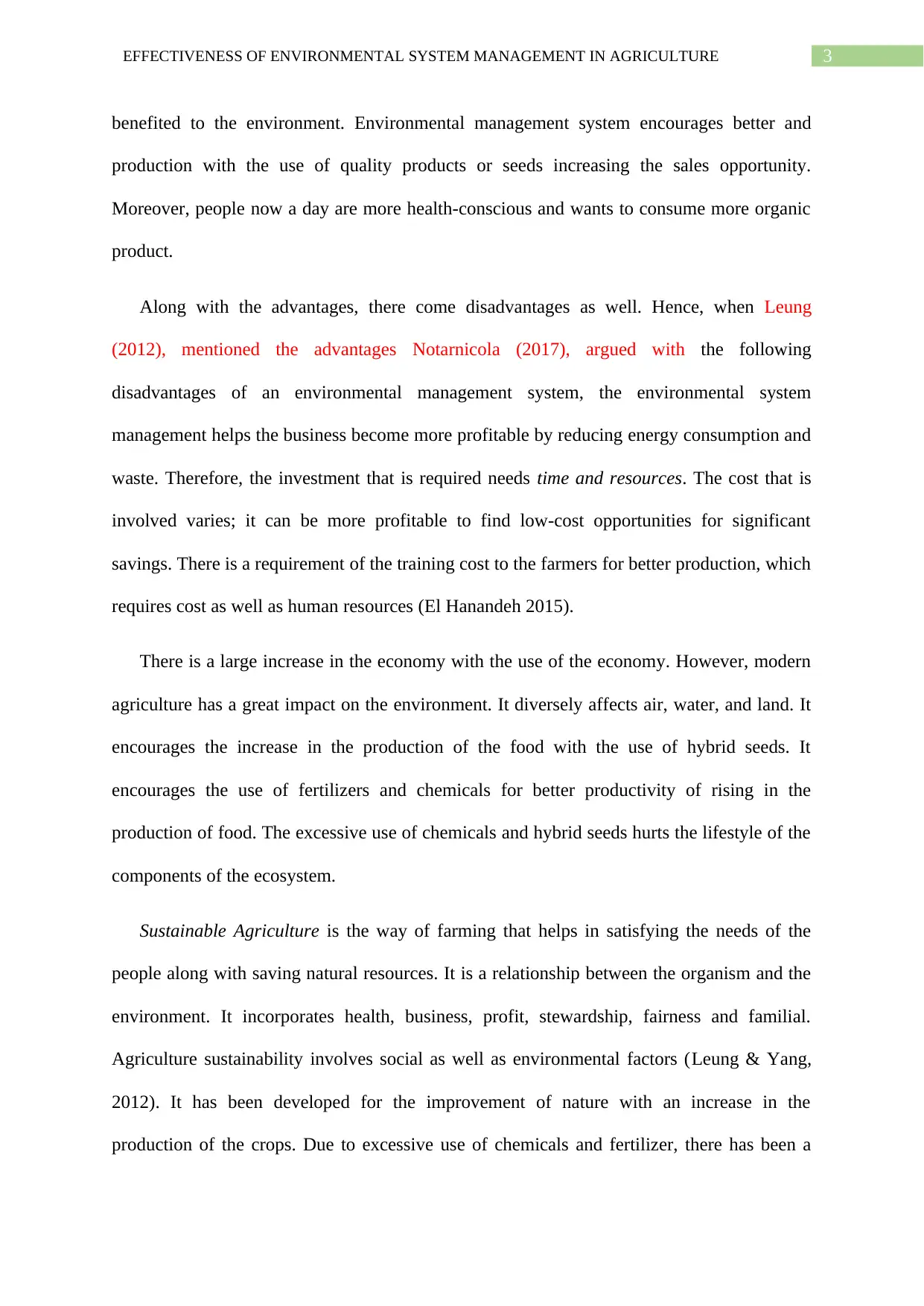
3EFFECTIVENESS OF ENVIRONMENTAL SYSTEM MANAGEMENT IN AGRICULTURE
benefited to the environment. Environmental management system encourages better and
production with the use of quality products or seeds increasing the sales opportunity.
Moreover, people now a day are more health-conscious and wants to consume more organic
product.
Along with the advantages, there come disadvantages as well. Hence, when Leung
(2012), mentioned the advantages Notarnicola (2017), argued with the following
disadvantages of an environmental management system, the environmental system
management helps the business become more profitable by reducing energy consumption and
waste. Therefore, the investment that is required needs time and resources. The cost that is
involved varies; it can be more profitable to find low-cost opportunities for significant
savings. There is a requirement of the training cost to the farmers for better production, which
requires cost as well as human resources (El Hanandeh 2015).
There is a large increase in the economy with the use of the economy. However, modern
agriculture has a great impact on the environment. It diversely affects air, water, and land. It
encourages the increase in the production of the food with the use of hybrid seeds. It
encourages the use of fertilizers and chemicals for better productivity of rising in the
production of food. The excessive use of chemicals and hybrid seeds hurts the lifestyle of the
components of the ecosystem.
Sustainable Agriculture is the way of farming that helps in satisfying the needs of the
people along with saving natural resources. It is a relationship between the organism and the
environment. It incorporates health, business, profit, stewardship, fairness and familial.
Agriculture sustainability involves social as well as environmental factors (Leung & Yang,
2012). It has been developed for the improvement of nature with an increase in the
production of the crops. Due to excessive use of chemicals and fertilizer, there has been a
benefited to the environment. Environmental management system encourages better and
production with the use of quality products or seeds increasing the sales opportunity.
Moreover, people now a day are more health-conscious and wants to consume more organic
product.
Along with the advantages, there come disadvantages as well. Hence, when Leung
(2012), mentioned the advantages Notarnicola (2017), argued with the following
disadvantages of an environmental management system, the environmental system
management helps the business become more profitable by reducing energy consumption and
waste. Therefore, the investment that is required needs time and resources. The cost that is
involved varies; it can be more profitable to find low-cost opportunities for significant
savings. There is a requirement of the training cost to the farmers for better production, which
requires cost as well as human resources (El Hanandeh 2015).
There is a large increase in the economy with the use of the economy. However, modern
agriculture has a great impact on the environment. It diversely affects air, water, and land. It
encourages the increase in the production of the food with the use of hybrid seeds. It
encourages the use of fertilizers and chemicals for better productivity of rising in the
production of food. The excessive use of chemicals and hybrid seeds hurts the lifestyle of the
components of the ecosystem.
Sustainable Agriculture is the way of farming that helps in satisfying the needs of the
people along with saving natural resources. It is a relationship between the organism and the
environment. It incorporates health, business, profit, stewardship, fairness and familial.
Agriculture sustainability involves social as well as environmental factors (Leung & Yang,
2012). It has been developed for the improvement of nature with an increase in the
production of the crops. Due to excessive use of chemicals and fertilizer, there has been a
Paraphrase This Document
Need a fresh take? Get an instant paraphrase of this document with our AI Paraphraser
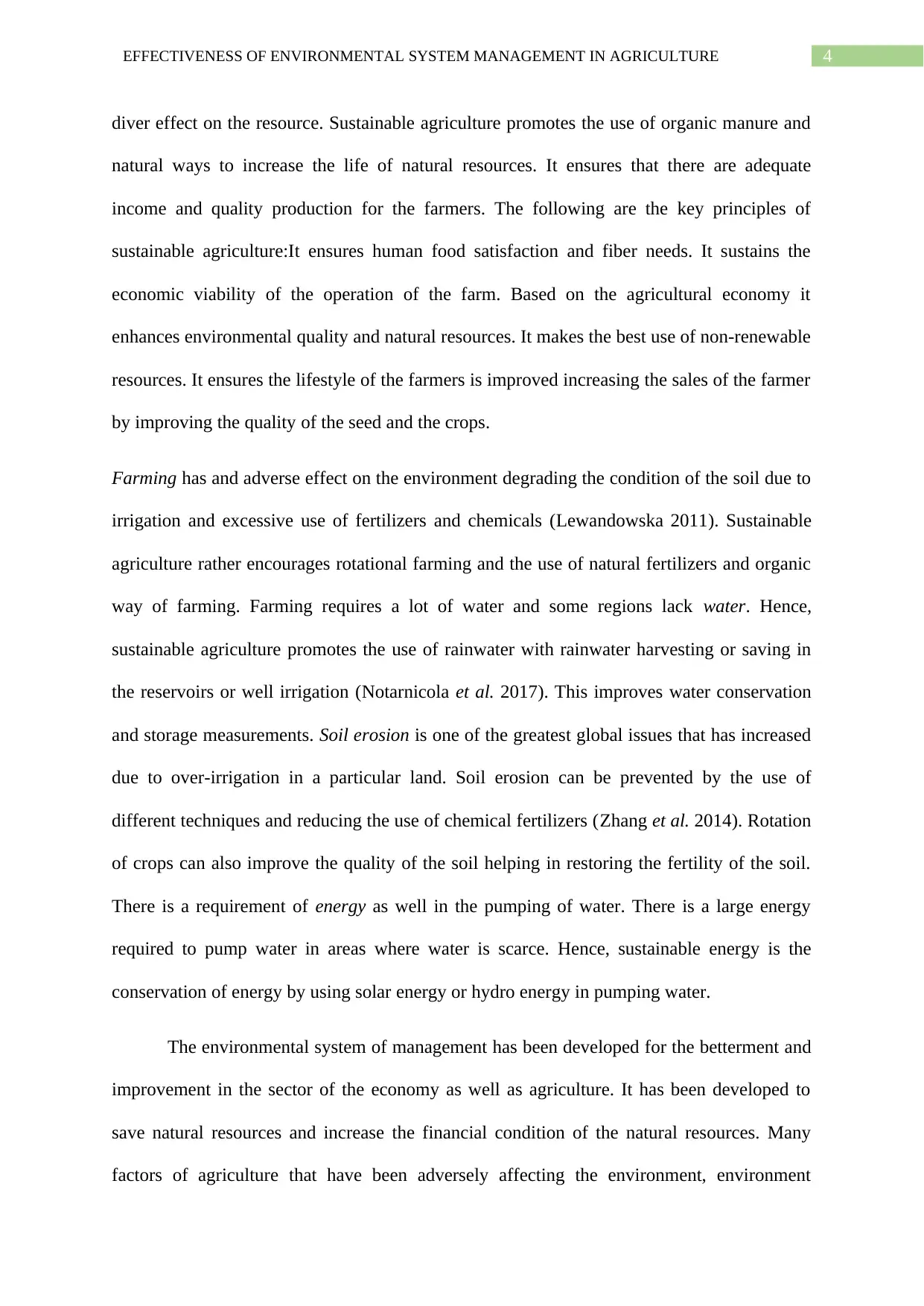
4EFFECTIVENESS OF ENVIRONMENTAL SYSTEM MANAGEMENT IN AGRICULTURE
diver effect on the resource. Sustainable agriculture promotes the use of organic manure and
natural ways to increase the life of natural resources. It ensures that there are adequate
income and quality production for the farmers. The following are the key principles of
sustainable agriculture:It ensures human food satisfaction and fiber needs. It sustains the
economic viability of the operation of the farm. Based on the agricultural economy it
enhances environmental quality and natural resources. It makes the best use of non-renewable
resources. It ensures the lifestyle of the farmers is improved increasing the sales of the farmer
by improving the quality of the seed and the crops.
Farming has and adverse effect on the environment degrading the condition of the soil due to
irrigation and excessive use of fertilizers and chemicals (Lewandowska 2011). Sustainable
agriculture rather encourages rotational farming and the use of natural fertilizers and organic
way of farming. Farming requires a lot of water and some regions lack water. Hence,
sustainable agriculture promotes the use of rainwater with rainwater harvesting or saving in
the reservoirs or well irrigation (Notarnicola et al. 2017). This improves water conservation
and storage measurements. Soil erosion is one of the greatest global issues that has increased
due to over-irrigation in a particular land. Soil erosion can be prevented by the use of
different techniques and reducing the use of chemical fertilizers (Zhang et al. 2014). Rotation
of crops can also improve the quality of the soil helping in restoring the fertility of the soil.
There is a requirement of energy as well in the pumping of water. There is a large energy
required to pump water in areas where water is scarce. Hence, sustainable energy is the
conservation of energy by using solar energy or hydro energy in pumping water.
The environmental system of management has been developed for the betterment and
improvement in the sector of the economy as well as agriculture. It has been developed to
save natural resources and increase the financial condition of the natural resources. Many
factors of agriculture that have been adversely affecting the environment, environment
diver effect on the resource. Sustainable agriculture promotes the use of organic manure and
natural ways to increase the life of natural resources. It ensures that there are adequate
income and quality production for the farmers. The following are the key principles of
sustainable agriculture:It ensures human food satisfaction and fiber needs. It sustains the
economic viability of the operation of the farm. Based on the agricultural economy it
enhances environmental quality and natural resources. It makes the best use of non-renewable
resources. It ensures the lifestyle of the farmers is improved increasing the sales of the farmer
by improving the quality of the seed and the crops.
Farming has and adverse effect on the environment degrading the condition of the soil due to
irrigation and excessive use of fertilizers and chemicals (Lewandowska 2011). Sustainable
agriculture rather encourages rotational farming and the use of natural fertilizers and organic
way of farming. Farming requires a lot of water and some regions lack water. Hence,
sustainable agriculture promotes the use of rainwater with rainwater harvesting or saving in
the reservoirs or well irrigation (Notarnicola et al. 2017). This improves water conservation
and storage measurements. Soil erosion is one of the greatest global issues that has increased
due to over-irrigation in a particular land. Soil erosion can be prevented by the use of
different techniques and reducing the use of chemical fertilizers (Zhang et al. 2014). Rotation
of crops can also improve the quality of the soil helping in restoring the fertility of the soil.
There is a requirement of energy as well in the pumping of water. There is a large energy
required to pump water in areas where water is scarce. Hence, sustainable energy is the
conservation of energy by using solar energy or hydro energy in pumping water.
The environmental system of management has been developed for the betterment and
improvement in the sector of the economy as well as agriculture. It has been developed to
save natural resources and increase the financial condition of the natural resources. Many
factors of agriculture that have been adversely affecting the environment, environment
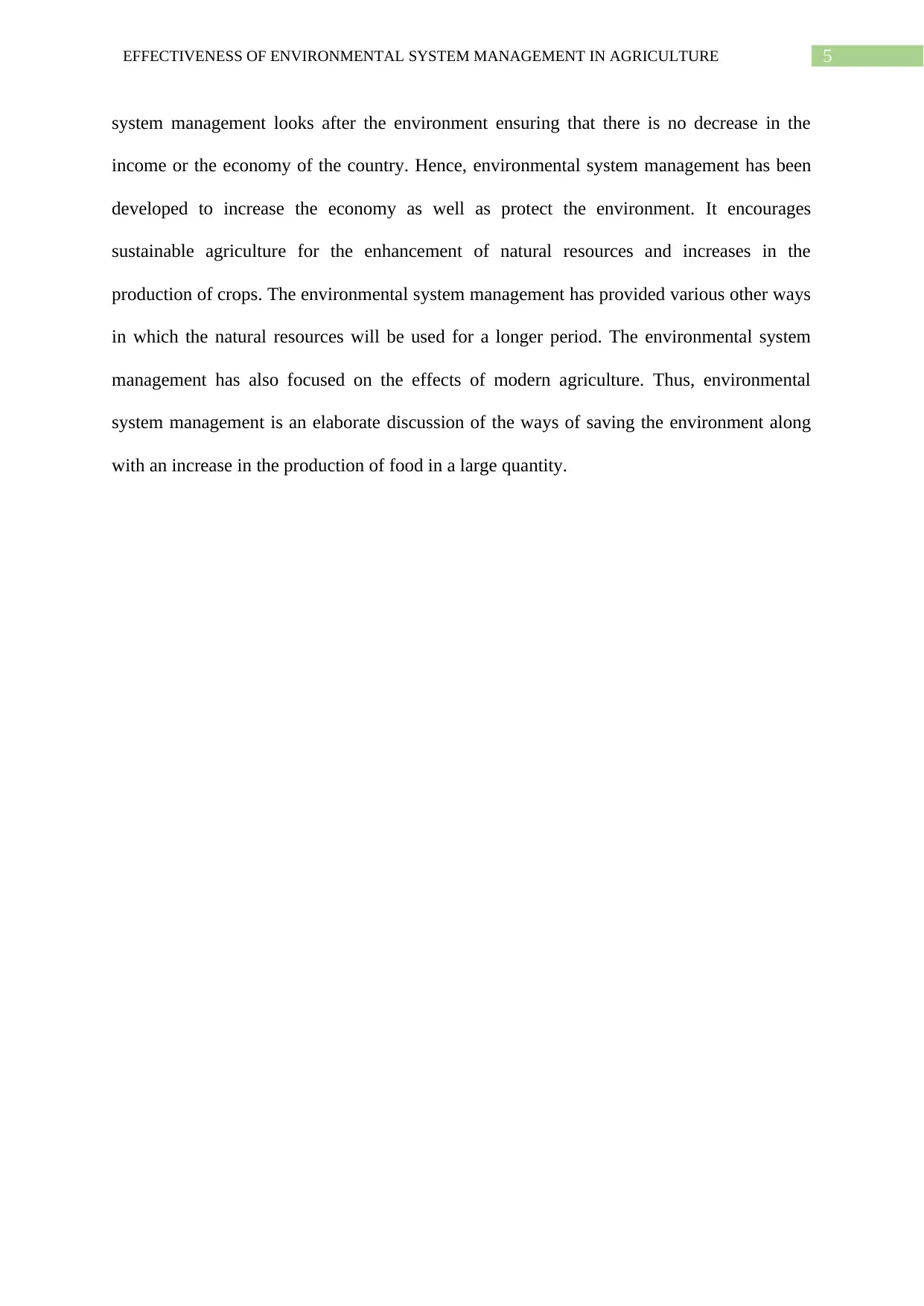
5EFFECTIVENESS OF ENVIRONMENTAL SYSTEM MANAGEMENT IN AGRICULTURE
system management looks after the environment ensuring that there is no decrease in the
income or the economy of the country. Hence, environmental system management has been
developed to increase the economy as well as protect the environment. It encourages
sustainable agriculture for the enhancement of natural resources and increases in the
production of crops. The environmental system management has provided various other ways
in which the natural resources will be used for a longer period. The environmental system
management has also focused on the effects of modern agriculture. Thus, environmental
system management is an elaborate discussion of the ways of saving the environment along
with an increase in the production of food in a large quantity.
system management looks after the environment ensuring that there is no decrease in the
income or the economy of the country. Hence, environmental system management has been
developed to increase the economy as well as protect the environment. It encourages
sustainable agriculture for the enhancement of natural resources and increases in the
production of crops. The environmental system management has provided various other ways
in which the natural resources will be used for a longer period. The environmental system
management has also focused on the effects of modern agriculture. Thus, environmental
system management is an elaborate discussion of the ways of saving the environment along
with an increase in the production of food in a large quantity.
⊘ This is a preview!⊘
Do you want full access?
Subscribe today to unlock all pages.

Trusted by 1+ million students worldwide
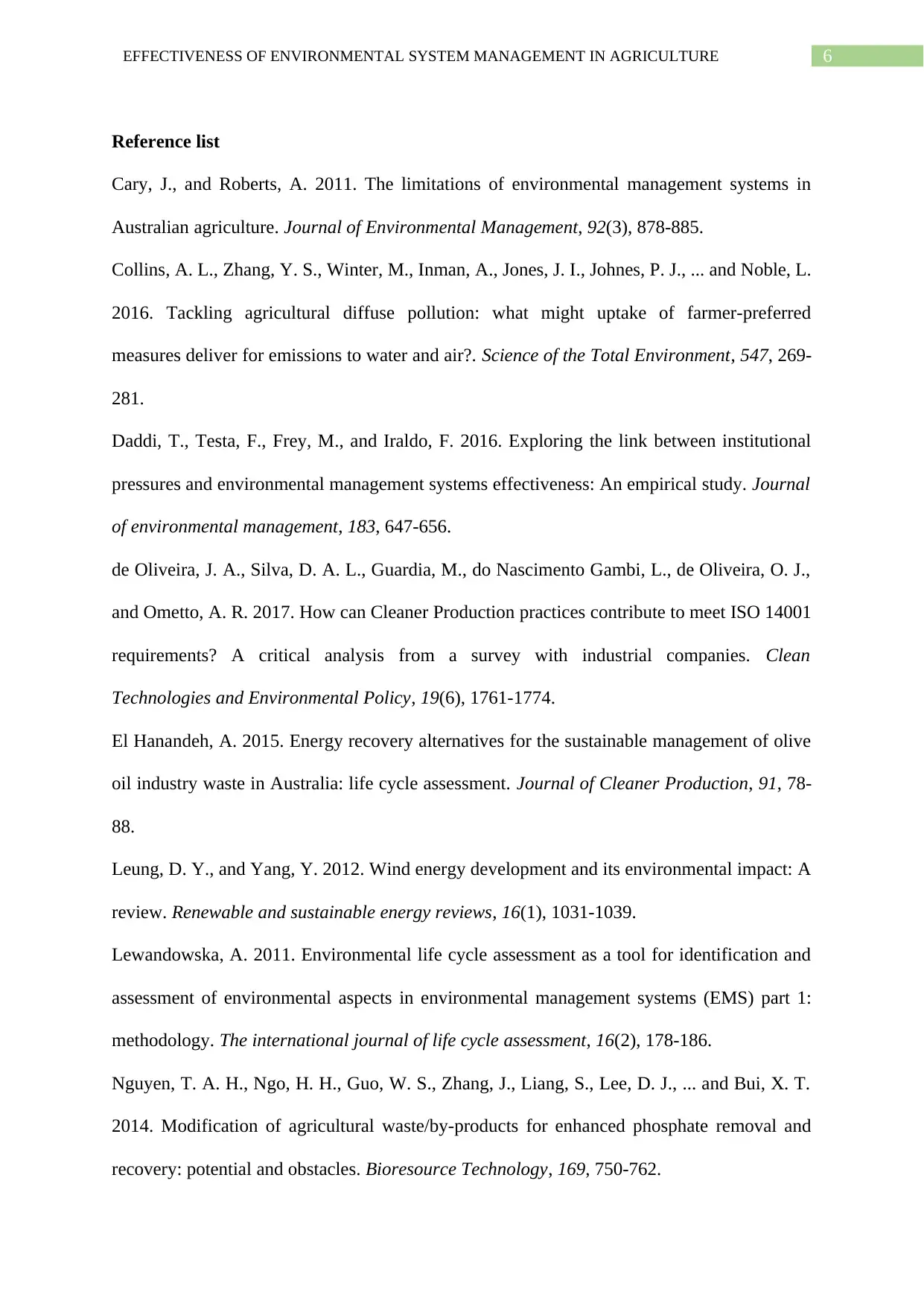
6EFFECTIVENESS OF ENVIRONMENTAL SYSTEM MANAGEMENT IN AGRICULTURE
Reference list
Cary, J., and Roberts, A. 2011. The limitations of environmental management systems in
Australian agriculture. Journal of Environmental Management, 92(3), 878-885.
Collins, A. L., Zhang, Y. S., Winter, M., Inman, A., Jones, J. I., Johnes, P. J., ... and Noble, L.
2016. Tackling agricultural diffuse pollution: what might uptake of farmer-preferred
measures deliver for emissions to water and air?. Science of the Total Environment, 547, 269-
281.
Daddi, T., Testa, F., Frey, M., and Iraldo, F. 2016. Exploring the link between institutional
pressures and environmental management systems effectiveness: An empirical study. Journal
of environmental management, 183, 647-656.
de Oliveira, J. A., Silva, D. A. L., Guardia, M., do Nascimento Gambi, L., de Oliveira, O. J.,
and Ometto, A. R. 2017. How can Cleaner Production practices contribute to meet ISO 14001
requirements? A critical analysis from a survey with industrial companies. Clean
Technologies and Environmental Policy, 19(6), 1761-1774.
El Hanandeh, A. 2015. Energy recovery alternatives for the sustainable management of olive
oil industry waste in Australia: life cycle assessment. Journal of Cleaner Production, 91, 78-
88.
Leung, D. Y., and Yang, Y. 2012. Wind energy development and its environmental impact: A
review. Renewable and sustainable energy reviews, 16(1), 1031-1039.
Lewandowska, A. 2011. Environmental life cycle assessment as a tool for identification and
assessment of environmental aspects in environmental management systems (EMS) part 1:
methodology. The international journal of life cycle assessment, 16(2), 178-186.
Nguyen, T. A. H., Ngo, H. H., Guo, W. S., Zhang, J., Liang, S., Lee, D. J., ... and Bui, X. T.
2014. Modification of agricultural waste/by-products for enhanced phosphate removal and
recovery: potential and obstacles. Bioresource Technology, 169, 750-762.
Reference list
Cary, J., and Roberts, A. 2011. The limitations of environmental management systems in
Australian agriculture. Journal of Environmental Management, 92(3), 878-885.
Collins, A. L., Zhang, Y. S., Winter, M., Inman, A., Jones, J. I., Johnes, P. J., ... and Noble, L.
2016. Tackling agricultural diffuse pollution: what might uptake of farmer-preferred
measures deliver for emissions to water and air?. Science of the Total Environment, 547, 269-
281.
Daddi, T., Testa, F., Frey, M., and Iraldo, F. 2016. Exploring the link between institutional
pressures and environmental management systems effectiveness: An empirical study. Journal
of environmental management, 183, 647-656.
de Oliveira, J. A., Silva, D. A. L., Guardia, M., do Nascimento Gambi, L., de Oliveira, O. J.,
and Ometto, A. R. 2017. How can Cleaner Production practices contribute to meet ISO 14001
requirements? A critical analysis from a survey with industrial companies. Clean
Technologies and Environmental Policy, 19(6), 1761-1774.
El Hanandeh, A. 2015. Energy recovery alternatives for the sustainable management of olive
oil industry waste in Australia: life cycle assessment. Journal of Cleaner Production, 91, 78-
88.
Leung, D. Y., and Yang, Y. 2012. Wind energy development and its environmental impact: A
review. Renewable and sustainable energy reviews, 16(1), 1031-1039.
Lewandowska, A. 2011. Environmental life cycle assessment as a tool for identification and
assessment of environmental aspects in environmental management systems (EMS) part 1:
methodology. The international journal of life cycle assessment, 16(2), 178-186.
Nguyen, T. A. H., Ngo, H. H., Guo, W. S., Zhang, J., Liang, S., Lee, D. J., ... and Bui, X. T.
2014. Modification of agricultural waste/by-products for enhanced phosphate removal and
recovery: potential and obstacles. Bioresource Technology, 169, 750-762.
Paraphrase This Document
Need a fresh take? Get an instant paraphrase of this document with our AI Paraphraser

7EFFECTIVENESS OF ENVIRONMENTAL SYSTEM MANAGEMENT IN AGRICULTURE
Notarnicola, B., Sala, S., Anton, A., McLaren, S. J., Saouter, E., and Sonesson, U. 2017. The
role of life cycle assessment in supporting sustainable agri-food systems: A review of the
challenges. Journal of Cleaner Production, 140, 399-409.
Waters, B. 2013. Introduction to Environmental Management: for the NEBOSH Certificate
in Environmental Management. Routledge.
Notarnicola, B., Sala, S., Anton, A., McLaren, S. J., Saouter, E., and Sonesson, U. 2017. The
role of life cycle assessment in supporting sustainable agri-food systems: A review of the
challenges. Journal of Cleaner Production, 140, 399-409.
Waters, B. 2013. Introduction to Environmental Management: for the NEBOSH Certificate
in Environmental Management. Routledge.
1 out of 8
Related Documents
Your All-in-One AI-Powered Toolkit for Academic Success.
+13062052269
info@desklib.com
Available 24*7 on WhatsApp / Email
![[object Object]](/_next/static/media/star-bottom.7253800d.svg)
Unlock your academic potential
Copyright © 2020–2026 A2Z Services. All Rights Reserved. Developed and managed by ZUCOL.





